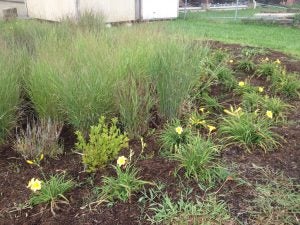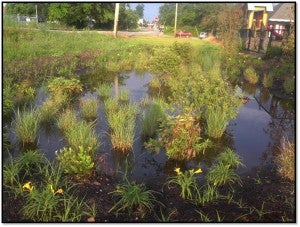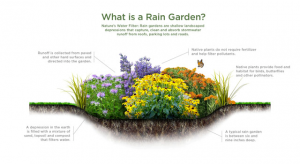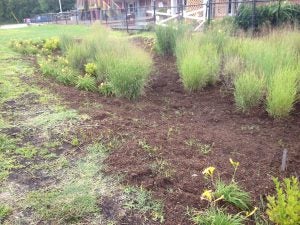 Marshall’s first Rain Garden, under the supervision of Enviromental Health and Safety, and with the assistance of the West Virginia Conservation Agency, was installed spring of 2013 behind the Marshall Child Development Academy.
Marshall’s first Rain Garden, under the supervision of Enviromental Health and Safety, and with the assistance of the West Virginia Conservation Agency, was installed spring of 2013 behind the Marshall Child Development Academy.
This garden is host to native plant species that assists with storm water management and pollutant filtration. Rain gardens divert rainfall from local storm water systems. This is important, as storm water systems can sometimes overflow and flood with heavy and/or extended rainfall. Rain gardens act as a water filtration system by diverting runoff water from streets and drive ways which could contain oil and other chemicals. [See it on Google Street View]
What Is A Rain Garden?
 A rain garden is a natural or man-made depression designed to capture storm water run-off from roofs, driveways, and other impervious areas. These rain gardens capture the water before reaching lakes, ponds, or rivers. A rain garden is planted with appropriate native, trees, shrubs, and flowers. Rain gardens are not only beautiful, but also enhance the surrounding water quality. When the storm water run off enters other water sources it can pollute that water by carrying contaminates that are on walkways, driveways, or
A rain garden is a natural or man-made depression designed to capture storm water run-off from roofs, driveways, and other impervious areas. These rain gardens capture the water before reaching lakes, ponds, or rivers. A rain garden is planted with appropriate native, trees, shrubs, and flowers. Rain gardens are not only beautiful, but also enhance the surrounding water quality. When the storm water run off enters other water sources it can pollute that water by carrying contaminates that are on walkways, driveways, or  rooftops. Rains gardens help protect the water by collecting the run off to soak into the ground.
rooftops. Rains gardens help protect the water by collecting the run off to soak into the ground.

Rain water run off can affect reduction in overall groundwater recharge, increase erosion, assist it loss of streams during dry times, decrease water quality, and increase flooding. Rain gardens can assist by allowing the run off water to infiltrate the water into the ground and avoid these problems
Along with improving water quality rain gardens provide other beneficial aspects. They provide a habitat for local wildlife, like a diverse group of birds, butterflies, and squirrels. They add an attractive landscape to an area, and are low maintenance. The gardens are relatively easy to install and can help improve the quality of the water from run off.
Reference:
- Healthy Landscapes: Rain Gardens. (n.d.). Retrieved from http://www.uri.edu/ce/healthylandscapes/raingarden.htm
- Watershed Council. Image retrieved from http://www.watershedcouncil.org/learn/rain-gardens/
Report By: Grif Griffiths